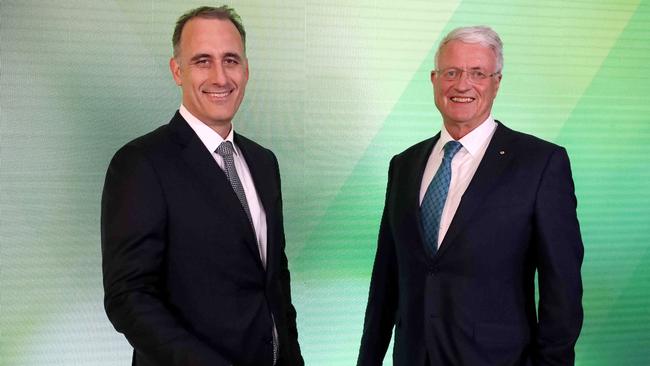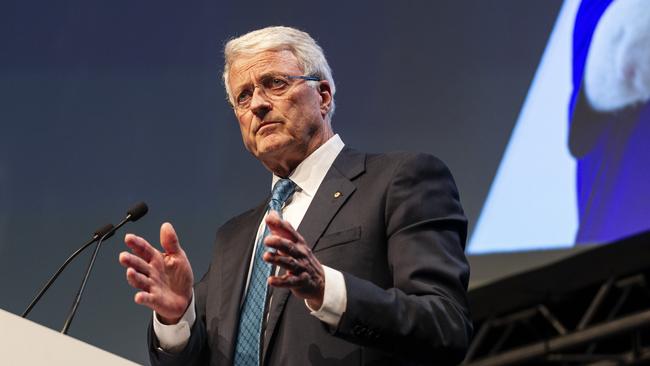Governments drowning in debt, warns Wesfarmers chairman Michael Chaney
The Wesfarmers chairman stressed the need for substantial economic reform in the face of the mountain of debt the government has run up.

Wesfarmers chairman Michael Chaney has warned against governments building up too much debt, arguing Australia is piling up an enormous burden that eventually must be repaid.
Mr Chaney, the former chair of National Australia Bank and Woodside Petroleum, also called on the federal government to urgently usher in a period of much-needed economic reform across tax, industrial relations and regulation.
But when pushed if there was political will in the country and the parliament to introduce reforms, he took a jab at the opposition, telling The Australian “the question of political will is up to the opposition, really”.
Speaking after the Wesfarmers annual meeting on Thursday at which he raised the spectre of Australia’s mountain of debt racked up during the COVID-19 pandemic, Mr Chaney dismissed printing money to solve the nation’s ills.
“First, I think the build-up of that debt is a real concern. I’m not a fan of modern monetary theory — that is, [that] there is a magic pudding and you just print money and it doesn’t matter,’’ Mr Chaney said.
“Even MMT advocates say eventually it has got to be repaid, generally they say it [is] through inflation and higher tax. Well if you get inflation you will get higher interest rates and that has all sorts of implications for the economy.”
Mr Chaney said Australia needed to focus on being more efficient to inspire investment in manufacturing and new businesses as it competed on the world stage.
“If we want to attract industries back here we need to have more flexible workplace relations, we need to have a world-competitive tax rate and we need to have far less red tape, where [now] it takes years to get something done,” he said.
He anticipated the arguments that would be thrown back at him by anti-business types and left-wing activists who consistently frame any call from a corporate executive for economic reform as simply “talking their own book”, saying reform was vital for employment growth and national prosperity.
“Critics of that say well you are just talking your own book, it’s for company profits,” Mr Chaney said. “This is about employment. This is about an economy that can fully employ people notwithstanding we have a huge amount debt that has built up and it needs to be repaid.
“And the only way you repay it is going to be by growing our economy, and we pay it not through higher rates of taxation but the higher tax collections, for example, because more people are working.’’
Earlier at the AGM, Mr Chaney said the nation would more than ever need healthy companies that could employ people and pay taxes, and pay down the debt, but this was in peril if businesses were not supported by a reform agenda.
“The health of the Australian economy relies on the health of companies like Wesfarmers. We are a huge employer of people and are responsible for the collection of billions of dollars in tax revenues each year,” Mr Chaney told shareholders.

The nation’s debt, now heading to $1 trillion, made that reform all the more crucial.
“The enormous government debt burden that has arisen from COVID-19 makes change in these areas even more critical than before if we are to ensure that our next generation have gainful employment and access to all the social services which we take for granted,” he said. “It will require inspired and determined governments to achieve this.”
In his address, Wesfarmers chief executive Rob Scott told shareholders that even with a vaccine the nation would probably be living with the risks of COVID-19 for months, if not years, and that for Wesfarmers the longer-term outlook remained uncertain.
Wesfarmers also provided a trading update before its annual general meeting, with consumers undertaking home projects and renovations sending sales for hardware chain Bunnings rocketing since July and similar strong sales growth experienced at Officeworks.
The Perth-based conglomerate however revealed that stock availability in some home products affected Kmart’s sales growth in July and August, with progress made to improve availability in recent months, despite long order lead times and recent industrial action at port terminals creating some challenges.
The Bunnings chain, which now accounts for the bulk of Wesfarmers’ earnings following the demerger of Coles, continues to be the star performer for the group.
In a trading update issued to the ASX, Bunnings posted total sales growth for July to October of 25.2 per cent and like-for-like sales growth of 30.9 per cent. At Officeworks, sales in the financial year to date rose 23.4 per cent. At Wesfarmers’ online marketplace Catch, total sales for the period rose 114.4 per cent.
At Kmart, total sales growth for the year to date was 3.7 per cent, with like-for-like sales up 9.4 per cent. Target’s total sales were off 2.2 per cent but like-for-like sales were up 9.9 per cent.





To join the conversation, please log in. Don't have an account? Register
Join the conversation, you are commenting as Logout